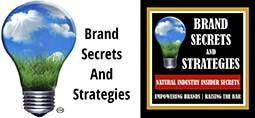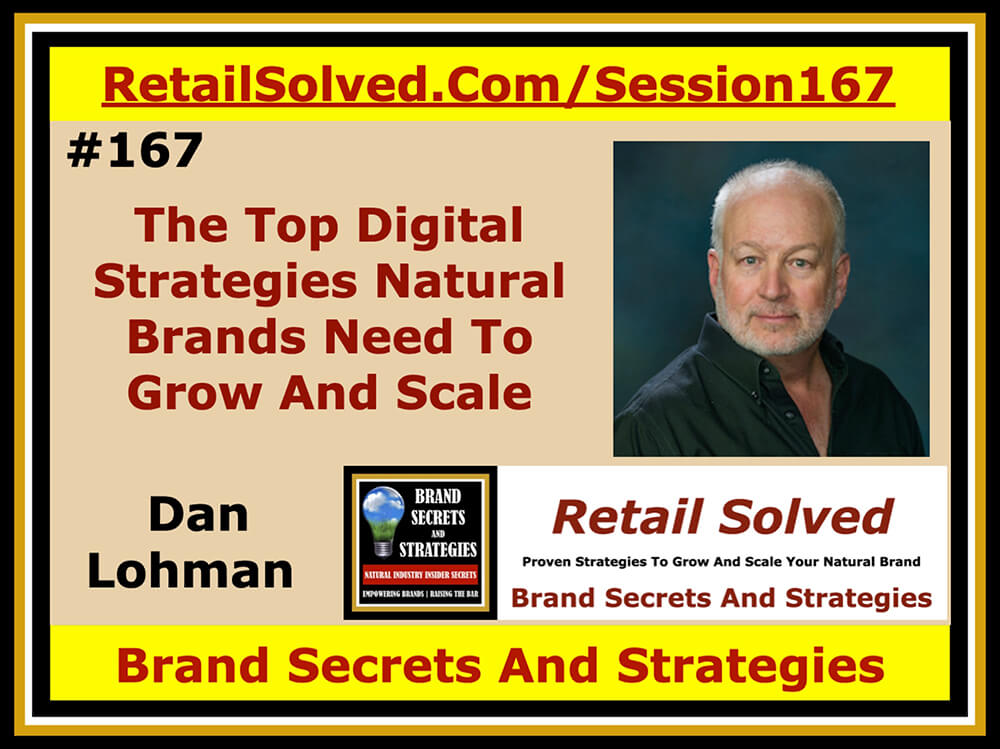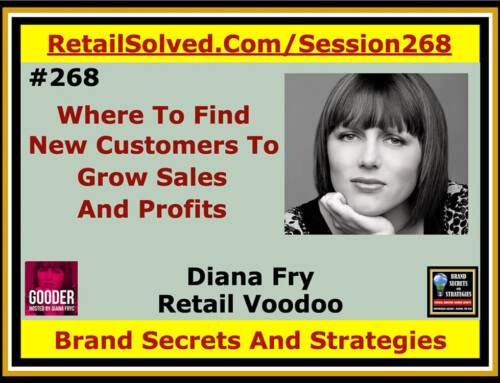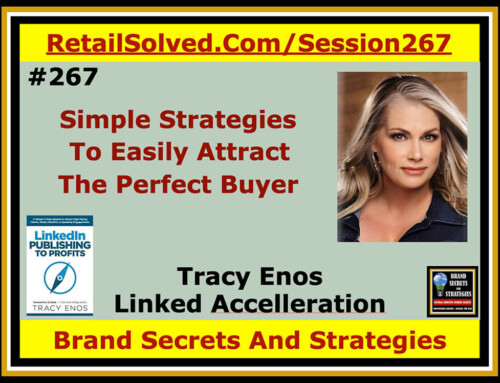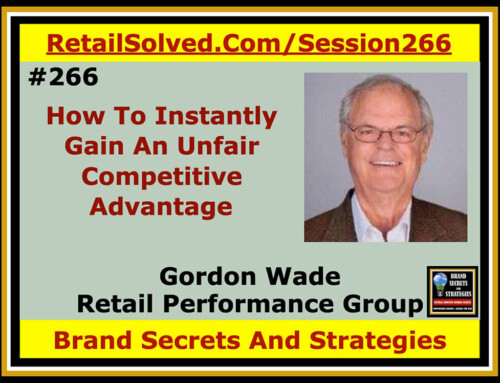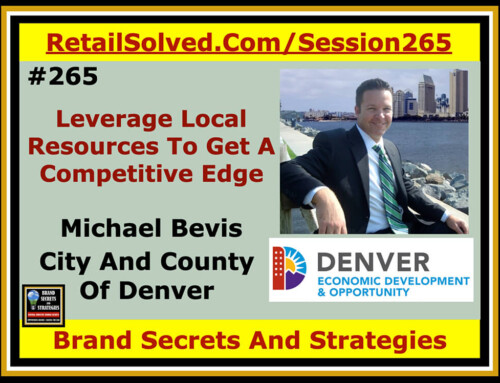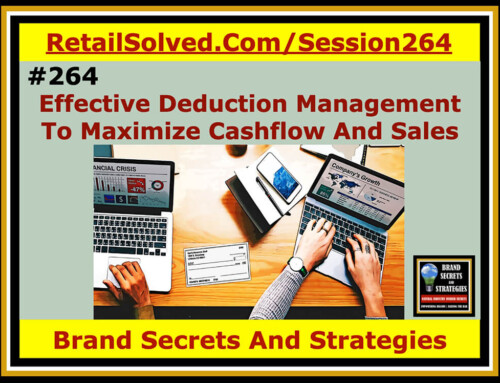Your brand needs to be available wherever your customers shop. That requires a robust digital strategy to level the playing field with big brands. NatchCom shares expert insights to teach brands how to grow and scale in traditional retail and online.
I spend a lot of time talking about why a digital strategy is so important to be able to support and grow your brand. If you want to know the key strategies to explode your growth and help you get your product in the hands of more shoppers, you're going to want to stay tuned to this episode.
Welcome. I just came back from NatchCom and I want to share some of the insights that I learned that you're going to need to know. These are the best strategies to help you grow and scale your brand. NatchCom is an organization that I'm extremely fond of. It's an organization that you should be paying attention to. The reason for that is because NatchCom strives to provide you with the best resources and insights to grow your brand by helping you understand what the best digital strategies are, what you need to know to differentiate your brand from other brands.
More importantly, they have the resources and the connections in the industry, so when they put on an event, it's not just a couple of people that claimed to know something about social media, these are the top people in the industry. For example, RangeMe was there. Amazon was there. Last year they had representatives from Facebook. These are some of the top people in the industry in terms of digital marketing, in terms of video, in terms of social media. These are the strategies that you need to be able to leverage as you grow and scale your brand. In fact, last year I had the privilege of being a speaker at NatchCom in Boulder. This is an organization that you're going to want to check out.
Download the show notes below
Click here to learn more about NatchCom
BRAND SECRETS AND STRATEGIES PODCAST #167 Hello and thank you for joining us today. This is the Brand Secrets and Strategies Podcast #167 Welcome to the Brand Secrets and Strategies podcast where the focus is on empowering brands and raising the bar. I’m your host Dan Lohman. This weekly show is dedicated to getting your brand on the shelf and keeping it there. Get ready to learn actionable insights and strategic solutions to grow your brand and save you valuable time and money. LETS ROLL UP OUR SLEEVES AND GET STARTED! I spend a lot of time talking about why a digital strategy is so important to be able to support and grow your brand. If you want to know the key strategies to explode your growth and help you get your product in the hands of more shoppers, you're going to want to stay tuned to this episode. Welcome. I just came back from NatchCom and I want to share some of the insights that I learned that you're going to need to know. These are the best strategies to help you grow and scale your brand. NatchCom is an organization that I'm extremely fond of. It's an organization that you should be paying attention to. The reason for that is because NatchCom strives to provide you with the best resources and insights to grow your brand by helping you understand what the best digital strategies are, what you need to know to differentiate your brand from other brands. More importantly, they have the resources and the connections in the industry, so when they put on an event, it's not just a couple of people that claimed to know something about social media, these are the top people in the industry. For example, RangeMe was there. Amazon was there. Last year they had representatives from Facebook. These are some of the top people in the industry in terms of digital marketing, in terms of video, in terms of social media. These are the strategies that you need to be able to leverage as you grow and scale your brand. In fact, last year I had the privilege of being a speaker at NatchCom in Boulder. This is an organization that you're going to want to check out. As always, I want to thank you for listening. This show is about you and it's for you. In appreciation for your time, there's a free downloadable guide for you at the end of every podcast episode. I always try to include one easy to download, quick to digest strategy that you can instantly adopt and make your own. One that you can use to grow sustainable sales with and compete more effectively. Don't forget to go back and listen to previous podcasts episodes where I might solve your most pressing bottleneck strategies that are validated by the leading CEOs and thought leaders in our industry. You're going to want to check them out. Remember, the goal here is to get your product onto more store shelves and into the hands of more shoppers, including online. In these shorter episodes, there's a YouTube component where I may share visuals to help illustrate some of the key points that I'm making, so you want to check out the videos as well. With the podcast and the YouTube channel, I want this to be a one-stop resource to answer all your most pressing questions. I want this to be the go-to resource that you leverage to help you compete more effectively. If you like the episode, share it with a friend, subscribe, and leave a review. If you want to see more of this brand-building content, then make sure to subscribe to my newsletter and smash the light bill so that you'd be the first one to get new brand-building content as soon as it becomes available. One of the things about NatchCom that I love is that so many of the strategies that they talk about our strategies that I've been sharing with you if you've been listening to previous podcast episodes. The reason this matters is that I believe you need to have a solid strategy so that you can make sure that your brand is available anywhere your customer's shop. This goes against the grain of what a lot of things that you might be hearing in terms of you need to start with this retailer, go to that retailer, use this distributor. Those are very good strategies, but the problem is retail's expensive, and by leveraging the strategies that we're going to talk about today in another previous podcast episodes, I'm going to show you how to get more runway from your available resources. I'm going to show you how to be able to negotiate better terms so that when you're talking to potential investors, you know what your brand's worth, and more importantly, you can help leverage the strength of your customer to negotiate better terms with that brand. One of the more recent podcast episodes I did was with Dustin Finkel who appeared on the Shark Tank, and these are some of the strategies that we've talked about, but now I'm going to take them to the next level and beyond. In fact, one of the things I wanted to start with was a quote that his wife left. "Become a student of everything." Christina Finkel was on one of the panel discussions and she was talking about what she and Dustin did to help get their product in front of the sharks. One of the key things that she shared is how they needed to react quickly to be able to get their product on Shark Tank, in addition to several of the key strategies that they leverage. At the heart of this, when she said, "Become a student of everything," what she was talking about is she said that you want to be able to ask smart questions so that when you're in the presence of people who can help you, you need to be able to ask the questions that are going to help guide you. They're going to help you achieve your objective. This is a core of everything I talk about on this podcast throughout all my content. The point is this; I believe that you need to keep your hand firmly on the rudder of your ship. I believe the worst thing that any brand can do is hand their keys to someone else, to let someone else other than you manage your brand. Now, certainly, you want to have partners like brokers and distributors and agencies help you, but I believe that all the strategies need to remain in-house, and this is exactly what Christina was talking about by keeping your hand on the rudder of your ship, by being able to ask those smart questions. In other words, knowing enough about what needs to be done to your brand so that you're able to ask intelligent questions to be able to address some of the mini-challenges and be prepared for all the opportunities in front of you. Christina shared that she and her husband had two weeks to prepare for getting on Shark Tank. They found out two weeks before the episode aired that they were going to be on, and this meant that they needed to completely redo their website. They needed to make sure that they had the product in the stores. They needed to make sure that their sales funnel was ready for the increased volume. They also needed to make sure that they had a solid digital strategy that was ready and prepared to handle all the questions and all the inquiries about their brand, Ka-Pop!. Another thing that came from the panel group that she was a part of, is that they recommended that you codify your brand's story before you launch your brand. This is exactly why I built my free turnkey sales store strategies course. The point is this; most brands pay lip service to this. The reason it matters is because big brands spend a lot of time talking at us. What you need to do is you need to understand who your core customer is, how they use your product. What are their needs that you're specifically addressing? How do they use your product after you take it home? You need to understand your brand's DNA, and this course, and of course this podcast, are going to help you understand how to tell your story so that it resonates most with your customers so that your brand becomes top of mind for them. By understanding your brand's DNA, this helps you know the value, the true value, of your customer, and then you can leverage that in traditional retail. You've probably heard me say this a lot of times. Retailers cannot possibly be experts in every product they sell, nor can they be an expert in your product. More importantly, they can't begin to be an expert in the customer that buys your product. This is why this matters. If you understand how to bake this into your selling story, then you can leverage it with retail to help them understand the value of your customer so that you can help them drive sales in their store and foot traffic in the store by leveraging the unique strength of your customer. Now, one of the key reasons that this matters is because shoppers today have literally unlimited choices as to where they shop. What's unique about most shoppers today is that they looked beyond the four corners of your package. You've got to have a strategy so that you can engage your customers beyond your package. What I'm talking about is a lot of customers research the products that they're going to buy, and they go onto your website and they want to learn more about the brand. They want to learn more about the founder. They want to know whether or not your product has authentic ingredients that they can trust. This is why you need to make sure that you're telling your brand's story on your website. Now, a big key to this is you need to have a multichannel strategy, and the reason this matters is because you need to be wherever your customer's shop. You need to be able to leverage all the platforms where your customers are shopping, where they're looking for specific information to solve their most pressing problems. This is your greatest opportunity to develop a community around your product. As you're beginning to understand who your core customers are, you need to have an authentic conversation with them. You need to invite them to be a part of your community. You need to be able to answer their questions and know where they shop. For example, I did a project once for a brand where we're trying to understand the customer that buys collagen and how they use collagen in their diet. One of the things that we identify is that that's something that's important to new moms, so we were able to leverage a strategy, a digital strategy, where we were able to get in front of mom's groups. While doing this, we were able to ask them what are the key questions that they were asking. In addition to that group, we are also able to identify other groups that use collagen and then build a brand story around it. This is the kind of information, the kind of strategies that you need to be able to leverage as you're beginning to understand who your customer is and how they shop your product. You need to own your customer on your platform. This is something else I talk about. Here's why. If all the retail stores disappeared, how would your customers buy your product? How would they get to know you? How would they engage with you? You need to own your customers beyond any other retailer, including online. By owning your customer, you can have that one-on-one relationship with them. In several of the podcast episodes, I talk about how you can leverage it to get a higher ROI on your trade spending, or more importantly, where you can leverage that unique customer that you have a relationship with when you want to innovate. If you ask your customers what products they want, they'll tell you, and by doing this you're going to save a lot of time on R&D. You're going to save a lot of time by bringing a product to market that nobody wants. This is one of the best strategies that you can leverage in terms of being able to grow your influence. The other reason, of course, is that if you have a relationship with your customers, then they're going to evangelize your product to their friends and family. They're going to help sell your brand on behalf of you because you've made an authentic effort to have that one-on-one relationship with them. Don't overlook this strategy. Again, this is all part of the turnkey sales store strategies, a course I talk about. Strategies that help you identify who that core customer is, develop a story or a strategy around them, and then leverage that strategy in traditional retail as well as online. At the core of this, you want to develop a loyal tribe, not just an audience. Think of it this way. An audience is a group of people, a group of women, a group of men, et cetera, but a loyal tribe. These are the people that have bent over backward to be the first to buy your product. Do you remember the craze around iPhones when they first came out? Do you remember hearing the stories about how people would line up for days to buy the new iPhone? Their loyal tribe is what helped Apple become the icon that it is today. In addition to that, you want to leverage micro-influencers, those people that have a connection within your community that is going to help you spread your message like wildfire. Don't forget to be authentic. You want customers to know, like, and trust your brand. Remember, building your own audience, your own community. This is the best strategy that you can have to ensure that your brand is future-proof. This is the best strategy that every brand needs to leverage, and one of the key components of this is you want to build an email list. Having an email list is a way to invite consumers to be a part of your audience. For example, one way to do this is to offer me an incentive, like a coupon, to be able to buy your product. Something that I can use to get a discount when I buy your product at retail. You don't control any of the retail space. Like I talked about at NatchCom, any of the social platforms that are out there, you're renting that space. Instead, focus on growing an email list. Own that list, own that community and have a relationship with them. Now, content is king. You want to provide beneficial content for your audience. For example, recipes. What are some of the unique ways that some of the people in your audience use your product? How do they use it when they take it home? How do they share it with their friends? Another strategy is to celebrate some of the people that use your products, some of your ideal customers, your loyal customers, and celebrate how they use the product. Engage your consumers. This creates a great opportunity for you to give back. You want to appeal to people's emotions. Now that you're beginning to understand who your core consumer is, how they buy your product, how they share it with their friends, then you want to take those insights and you want to bake that into your selling story, and the best place to do this is on your website. On your website, you want to speak to humans. You want to talk about the experience that your customers are having. You want to be able to answer other important questions. One of the best ways to do this is by leveraging SEO, something we talked a lot about at NatchCom. When you're trying to be authentic and you're talking about SEO, you want to talk about SEO from the perspective of a human. When you're developing an SEO strategy, you want to use the same language that your customers use when they're talking about your product. Going back to what we've talked about a minute ago, that's why it's so important to engage your community. Use the same terminology, the same language that they do. This is how you drive authentic traffic to your website. From my experience, when I was able to clarify my brand's story and then put it on my website, I more than tripled the amount of traffic going to my website, organic traffic. The point is this; this is one of the best strategies that you can leverage in terms of bringing people to your audience. What I recommend first is you build your SEO. You get more people coming to your website. Next, you work on building that community through email lists. You continue to work to bring more people in your community and then you need to talk about conversion. In other words, how do you get people to convert to your newsletter, or more importantly, how do you get people to convert to your product? To get them to choose your product over other brands on the shelf. This is something that I cover throughout all my podcast episodes and on the YouTube channel. The next tip I want to share is you want to focus on friction elimination. The reason this matters is because you want to make it easy for customers to say yes to your product, so that when you're working with a retailer, for example, you want to make it really easy for customers to say yes to your product. You want to make it really easy for the retailer to say yes to putting your product on the shelf where it belongs, where your customers can find it. As you're putting a store together on your website or whether or not you're using Amazon or some other platform or traditional retail, always be thinking about the customer journey. How does the customer go about buying your product? What problem are they trying to solve? Why should they choose your brand over another brand? Then make it easy for that customer to buy your products. One of the things I talk a lot about on this podcast and on the YouTube channel is understanding the customer journey. The reason this matters is because customers when they buy your products, buy other products as well. Help the retailer, whether it be online or traditional retail, understand how customers shop, how they buy other products in addition to yours, how your product is the gateway to other products they might be looking at. Another key thing that they talked about at NatchCom is that you need to network. You need to be fearless. You need to speak to everyone. You need to be able to tell your brand's story in two minutes or less so that when you're networking with people, not only can you share what you do, but you can learn from them. You want to be a sponge. How can they help you with your business? What I find interesting is that people that I had a relationship many, many years ago are people I keep bumping into within this industry. You also want to make sure that you use those connections. I use LinkedIn, so if you're on LinkedIn, make sure you connect with me. One of the things I love most about social media platforms, especially in LinkedIn in my case, is I can connect with people that I used to know, people that I had a relationship, someone that used to be a grocery manager that might be the head of a brand today. These relationships are invaluable. By never missing an opportunity to network and by being able to tell your brand's story, these people can help guide you to help you get your product onto more store shelves and in the hands of more shoppers. They can also help connect you with people that might be able to help get your brand into more store shelves. By knowing your brand's story, by being able to tell it within two minutes, and by always being out there talking to people, getting to know people, don't miss a single opportunity to get to know people within your industry, to get to know your customers better, like you would a friend. This is how you convert them to become a loyal brand evangelist. This is how you can leverage your network to help you get onto a store shelf. Another great quote that I heard, and I'm sorry I don't remember who said it, was that advertising is the gasoline, marketing is the match. Think about that. I love that. Advertising does nothing if you don't have a relationship with your customers. By being able to put the marketing muscle behind it, this is where you develop the engagement. This is where you become relevant to the customer that's going to buy your product. This is where you become relevant to the retailer that wants to merchandise your product, that wants to leverage the strength of your customer to grow sales in their store. Another key thing that they talked about at NatchCom is that you need to use expert specialists. This is also something I talk about a lot. I'm always talking about canned topline templated reports will never differentiate your brand from your competition, especially if it's the same report that they're using, formatted differently. By being able to ask the right questions of the right people, this is how you get the expert help that's going to help propel you. Let me give you an example from my own situation. My original email service provider wasn't able to grow. This was the email service provider that was recommended to me by an "expert". I spent a lot of time and a lot of money trying to learn the platform so I could put together my weekly newsletter to give you the kind of insights that you're enjoying today. The problem was it didn't scale or grow with my business. Now that I've learned so much more about how to connect with consumers and how to build an online business, I use an email service provider that allows me to segment my audience around how my customer's shop. This is exactly what you need to be doing. You want to identify those key things that are unique about your customers and segment them into different buckets so that you're personalizing your message with them so that you're not talking to everyone as a generic customer. Going back to some of the examples I talked about earlier, you could have an email list that's segmented around customers that want recipes. You can have another group within your email list that want to engage with your product beyond the store shelf, who want to be part of your tribe, and you can have another group within your email list that's going to be able to help you, help guide your brand as you begin to grow and innovate. If you could personalize their journey to help you get in front of their customer, to help you meet their specific needs, this is going to help you develop that relationship with them that you can leverage at retail. That relationship with them is going to future-proof your brand. At one session at NatchCom, they talked about what your goals are. You need to be able to identify what it is that you're trying to achieve. The first thing they talked about is you want to increase the number of customers coming into your funnel, the number of customers that you build awareness with. The next thing is you want to increase the amount of traffic that you have coming to your site, the amount of traffic that you have getting onto your email list, the amount of traffic that you have of people buying your product. Then the next thing you want to do is you want to focus on increasing the frequency of the customers that buy your product. You need to know the lifetime value of your customer. It's a lot easier to sell to your loyal customers than to reacquire customers over and over again. On one of the podcast episodes, I was talking to the former marketing manager of Whole Foods Market, and she shared on that podcast episode what it cost them to reacquire a customer. You'd be surprised. The point is that you need to find strategies where you can bring those customers into your ecosystem and have a longterm relationship with them so that they continue to buy your product again and again and again, while they share the value of your product with their friends and family. Now, one of the things that they talked about, which I think is critically important that unfortunately a lot of brands overlook, is that you want to manage your customer reviews. A lot of companies ignore their customer reviews. They talked out why this is so critically important. If you've got a customer that gives you a bad review, reach out to that customer and find out why they said that. Why did they review your product that way? This might be an opportunity, an excellent opportunity, for you to listen to your customer and understand what unmet need you have so that you can pivot and address it. Maybe a product didn't meet their standards and perhaps you might need to replace it. You leverage these opportunities to help satisfy those customers so they'll come back and leave a really good review later. Another key point that they talked about in terms of managing your customer reviews is you're going to learn how your customers use your product. They're going to tell you exactly, specifically, what they like about your product so that you can do more of what they like, or you can fix what's broken. Customer reviews are one of the greatest opportunities that you have to get feedback about your brand. I talk a lot about how big brands use focus groups to get information about how customers are going to use their products. The problem with focus groups is you don't always get authentic information about why people like your product. By managing your customer reviews, you're getting real information, real-time information, about how customers like your product. This is another reason why you want to have a community around your brand. If you have a community around your brand, I've seen some communities help answer some of your customer reviews. In other words, a customer has a question about your product, and I've seen people within different communities reach out to those customers and help answer their questions. You cannot ask for better publicity than this, and you cannot ask for a better endorsement than this. Having one of your customers address another customer's needs, concerns, issues, and wants. Another thing we talked about briefly was you need to make sure the data's clean. You need to make sure that your content, everything that you have out there or on every platform is consistent. You need to make sure that has all the information in it so customers can make a good decision to buy your product, why they should choose your product over the next product and so on. You want to make sure your product images are up-to-date. A lot of brands don't do this, including the big brands. This can be a bit of a struggle. I'll talk more about that on different podcast episodes, but when you're talking about the content that you have out there on every single social media platform and every single retail platform, what the retailers are using on their online platforms, et cetera, you've got to make sure it's consistent. What I talk about in the turnkey sales store strategies course is the importance of making sure that everyone who talks about your product, including all your online profiles, you've got to make sure that they understand all the key things about your product, that there's no miscommunication. What are the best questions that I heard from Ted, who's the CEO of NatchCom, was what tactics do you use to look around corners? How do you predict buying habits? This is the core of everything I talk about on the podcast. This is the core of what we talked about at NatchCom. By knowing who your customer is and by building a community around them, by building a tribe, you can leverage the relationship that you have with them so that they will help you stay on top of trends. They'll help you understand or stay on top of what's going on in the marketplace. For example, I routinely send emails to people that I know who own brands, letting them know that they might have an out-of-stock, or maybe a sign's missing, or I see something in a retail store, a competitive threat that they need to know about. Your community is going to help you understand what the trends are. They're going to help you see around the corners. Now, the other key thing you need to do to answer Ted's question is you need to know your numbers. You need to understand how people buy your product, or as my boss used to say, "Why what happened, happened." In other words, someone took something off the shelf. Why did they choose your product over another product? What are some of the other things that motivated them to choose one product over another product? By understanding why what happened, happened, and then by understanding what the trends are, why customers choose your product over another product, what the trends are in the category, what are the important things customers want you to address? By understanding that, bringing that all together, this is going to give you insight into what the future holds, and this is how you skate to where the puck's going. This is how you stay ahead of your competition. By leveraging all of these resources: the podcast, the YouTube channel, NatchCom, et cetera, you can gain a significant and sustainable competitive advantage. This is how you level the playing field between you and the most sophisticated brand in your category. I've already had several NatchCom speakers on the podcast already, but you'll want to stay tuned because I'm going to have even more of them on the podcast. I'm going to be covering a lot of things that I touched on today. Digital strategy, video, social media, selling on Amazon, Shopify, how to leverage compostable printer demand packaging to grow your brand. These are strategies that are going to help give you a significant and sustainable competitive advantage, so you're going to want to stay tuned. I want to thank NatchCom for putting on their event. It's a tremendous resource. I encourage you to learn more about them and attend their next event. I'll be certain to put a link to NatchCom in the show notes and on the podcast webpage. Today’s free downloadable guide is the Turnkey Sales Story Strategies course. This is the foundation that every brand needs to be built on. You can get it on the podcast page and you can get there by going to BrandSecretsAndStrategies.com/session167. Thank you for listening and I look forward to seeing you in the next episode. Thanks again for joining us today. Make sure to stop over at brandsecretsandstrategies.com for the show notes along with more great brand building articles and resources. Check out my free course Turnkey Sales Story Strategies, your roadmap to success. You can find that on my website or at TurnkeySalesStoryStrategies.com/growsales. Please subscribe to the podcast, leave a review, and recommend it to your friends and colleagues. Sign up today on my website so you don’t miss out on actionable insights and strategic solutions to grow your brand and save you valuable time and money. I appreciate all the positive feedback. Keep your suggestions coming. Until next time, this is Dan Lohman with Brand Secrets and Strategies where the focus is on empowering brands and raising the bar. Enter your name and email address below and I'll send you periodic updates about the podcast. Sign up to receive email updates
Listen where you get your podcast
Like what you’ve heard? Please leave a review on iTunes
FREE Trade Promotion ROI Calculator:
Click Here To Maximize Sales And Profits
Free brand-building resources to help you grow and scale
Turnkey Sales Story Strategies FREE ON-DEMAND COURSE
Why Most Brands Fail – The Roadmap To Sales Success FREE ON-DEMAND COURSE
Essential In-Store Customers First Marketing Strategies FREE ON-DEMAND COURSE
How To Drive Profits With Sustainable Packaging FREE ON-DEMAND COURSE
The Retail Game – What You Need To Know With Bob Burke FREE ON-DEMAND COURSE
Sales Success Begins With A Solid Business Plan FREE ON-DEMAND COURSE
How To Turn Your OnLine Data Into Explosive Sales Growth FREE ON-DEMAND COURSE
2016 Category Management Handbook Page 20 & 21
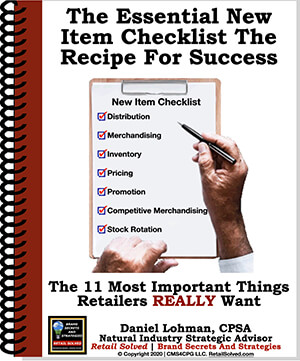
Want A Competitive Edge? The Recipe For Success
New product innovation is the lifeblood of every brand. New products fuel sustainable growth, attract new shoppers and increase brand awareness. Know the critical steps to get your product on more retailer’s shelves and into the hands of more shoppers.
Empowering Brands | Raising The Bar
Ever wish you just had a roadmap? Well, now you do!
Don’t miss out on all of these FREE RESOURCES (strategic downloadable guides, podcast episodes, list of questions you need to be asking, and know the answers to, the weekly newsletter, articles, and tips of the week. You will also receive access to quick and easy online courses that teach you how to get your brand on the shelf, expand distribution, understand what retailers REALLY want, and address your most pressing challenges and questions.
All tools that you can use, AT NO CHARGE TO YOU, to save you valuable time and money and grow your sales today!
Image is the property of CMS4CPG LLC, distribution or reproduction is expressively prohibited.
